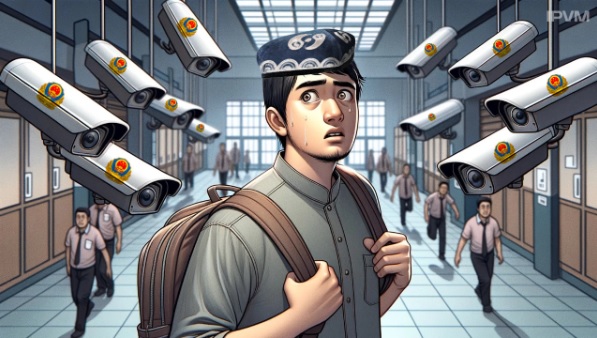Uyghur students are being explicitly targeted as part of a wide-ranging "anti-terrorism" project in a major PRC city.
This confirms PRC discrimination against Uyghur students, with Hikvision separately winning a 'Smart Campus' deal requiring Ramadan warnings for minorities.
Uyghurs are often treated as "terrorists" by PRC policing systems with e.g. Dahua tracking "Uyghurs with hidden terrorist intentions".
Executive Summary
A Hangzhou police project tracks "Uyghur university students" to "predict and control" people "related to terrorism", automatically alerting police of any "abnormal behaviors".
Behaviors considered "abnormal" include certain types of purchases, VPN usage, online communications, and even gathering at unspecified religious centers.
The system is aimed at securing Hangzhou and the 2023 Asian Games held there this fall. Four PRC integrators competed over the tender.
Hangzhou is a huge city of 11m people and is the headquarters of Alibaba, Hikvision, Dahua, and Uniview, although none of those companies were involved in this deal.
"Counter-Terrorism" System For Hangzhou Asian Games
In January 2022, the Counter-Terrorism Department of Hangzhou Municipal Police put out a ~$85,000 tender for an intelligence system that can meet "the needs of counter-terrorism work" (面向反恐业务需求) by utilizing "advanced technologies" and "big data" (利用云计算、大数据等先进技术).
The project is meant to improve the department's "ability to predict and control all kinds of local terrorism-related persons" and provide security for the Hangzhou Asian Games (以此提升反恐部门对本地各类涉恐人员的预测与管控能力,为亚运安保提供信息化保障.)
The Hangzhou Asian Games were held from September-October 2023 and touted as an "unprecedented success" by PRC state media.
Uyghur Student Tracking System With "Abnormal Behavior" Alerts
The winning bid was submitted by PRC integrator China Oly, which pledged to develop a "comprehensive management and control platform" for "Uyghur students", including "trajectory monitoring" and "warnings of online and offline abnormal behaviors":

Note that this system is not China Oly's idea; it is copy/pasted directly from the tender itself.
Project Price, Specs Examined
The 2-page bid makes no mention of any specific hardware or software. China Oly priced the Uyghur surveillance system at 164,000 Chinese Yuan which is about ~$23,000 at current exchange rates. This is about a third of the total winning bid's value of ~$79,000.
The project is supposed to be built in 6 months and usable by up to 200 police officers; China Oly is required to provide maintenance and support for the system for 5 years.
How Tracking Uyghur Students Works
The project integrates data from Hangzhou's universities and colleges to track Uyghur students specifically (能够通过与教育局、高校等对接获取维族学生的信息.) Most of the data used already exists in Hangzhou Police's "City Brain Operating System" (城市大脑·警务操作系统), which China Oly helped launch in 2019.
PRC cities have huge police live facial recognition / ANPR networks and also track people's smartphones through WiFi 'sniffers' and IMSI catchers, The New York Times reported in 2022. PRC police also have automatic access to certain types of data from private entities, such as hotel check-ins, which is not the case in the US.
Finally, tracking Uyghurs is easier as PRC resident identity cards disclose one's ethnic group.
Uyghur Students "People of Concern"
The tender states "Uyghur students in colleges and universities" are "people of concern" who require monitoring:

The system "automatically calculates the terrorism-related risk index for each group of concern in Hangzhou" (自动对每一名在杭关注群体进行涉恐指数计算).
"Abnormal Behaviors" Include Gathering at "Religious Sites"
The tender requires a system of "alerts" to police based on "abnormal behaviors" by "people of concern", including Uyghur students.
"Abnormal behaviors" include 'unusual' purchases, gathering at unspecified 'religious sites', certain online activities, 'abnormal' VPN usage, and more:

Below is a full explanation of each "abnormal behavior" that can trigger an alarm:
- Gatherings at Religious Sites: The system flags gatherings of specific groups at religious sites, especially if the number of people and their proximity to each other meet certain (unspecified) criteria. (宗教节点聚集发现告警)
- Abnormal Student Behaviors: The system aims to identify unusual student activities, such as searching for sensitive items online, "abnormal" VPN usage, staying outside school by checking hotel records, and involvement in gambling or loan-related activities. (学生异常行为模型 网上搜索敏感物品、VPN异常行为、校外住宿、涉赌涉贷等潜在风险模型)
- Unusual Purchasing Patterns of Sensitive Materials: This refers to monitoring people who buy sensitive materials in a manner that is considered abnormal, such as frequent purchases or buying in large quantities (敏感物资异常购买行为发现). The specific materials are not identified, however.
- "Risky" Online Activities of Sensitive Populations: This refers to monitoring what people post or the kind of messages people send to each other. (敏感人群网上风险行为发现告警).
- Unregistered Sensitive Populations: This involves detecting "unregistered" "sensitive populations" based on their activities and movements (未登记疑似敏感人群发现告警). Typically, this includes Uyghurs who are staying in hotels or apartments without permission from police, which is a violation of anti-terror rules and can result in getting sent to re-education camp.
The tender notes there are "other" abnormal behaviors for "counter-terrorism" purposes without detailing them.
Tracks "Faces, Vehicles, Trajectories" On "Map"
The tender tracks "faces, vehicles, trajectories, and network locations" of "people of concern" who are then displayed on a "map" that alerts whenever targets enter unspecified "prevention and control" zones:

This "map" includes precise latitude and longitude data as well, the tender says.
Anti-Uyghur Discrimination Part Of PRC Surveillance Business Model
This is yet another example of how PRC surveillance companies profit from targeting a vulnerable minority group, which the Holocaust Museum says is "at serious risk of genocide".
This also shows how Hangzhou has a track record of involvement in rights-abusing solutions, with Hangzhou firms Alibaba, Hikvision, Dahua, and Uniview all getting caught: Alibaba Uyghur Recognition As A Service, Hikvision Markets Uyghur Ethnicity Analytics, Dahua Provides "Uyghur Warnings" To China Police, and Uniview Racist Uyghur Recognition Revealed.
In public no PRC company has admitted to targeting Uyghurs, but internally this has happened at least once, when Hikvision's own hired attorney admitted to partners that Hikvision's huge Xinjiang police contracts target Uyghurs.
https://ipvm.com/reports/hangzhou-uyghur-student

